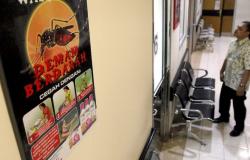“As I’m talking to you, people are being shot,” Pierre* says from Port-au-Prince, the capital of Haiti. The Caribbean country, with a population the size of Belgium, is in a dizzying spiral of violence. The decapitated government and weak security services cannot stand up to violent gangs, who have de facto control over the capital and the entire island. According to the United Nations, more than 2,500 people have been killed, kidnapped or injured this year.
After Haitian Prime Minister Ariel Henry flew to Kenya in late February to negotiate an international peacekeeping force for his country, the gangs prevented him from returning. Since then, the infamous Jimmy ‘Barbecue’ Chérizier became the most powerful man in Haiti. His sinister nickname is said to refer to the practice of locking people in houses and then setting them on fire. Chérizier heads a coalition of gangs that have turned the country upside down since the beginning of this month. Prisons were attacked, hospitals, police stations and government buildings looted and burned, and a state of emergency was declared. The gangs achieved their goal: Henry resigned.
Henry, however, had one condition: there had to be a temporary transitional council to lead Haiti until the country could organize elections. That transitional solution is now finally in the making, according to the UN all members have been nominated.
But an end to the violence is not yet in sight. Barbecue and his ilk continue to apparently roll out their power in the capital, putting pressure on Haitian political groups not to accept the transitional council. “I will know if you children, men or women are in Haiti,” threatened Barbecue, who previously described himself as “a revolutionary who fights for a dignified existence for Haitians.”
Gang leader killed
“I was just about to leave for the supermarket nearby, but I don’t go out for anything else,” says Belgian Jan Hoet, who has lived in Haiti for more than fifty years and is developing a sports center for children in Port-au-Prince. the neighbourhood. In a telephone conversation with The standard he says it feels like he is under house arrest: “I can’t even withdraw money. All banks are closed.”
The streets of Port-au-Prince are almost empty. One store after another has to close its doors. Because the gangs control the airport, ports and all roads to the capital, they control the country’s supplies. “As a result, there are too few medicines and food. Everything becomes very expensive. Moreover, people can hardly get into the interior. It is extremely dangerous to leave the capital, especially with a private car.”
The population has nowhere left to go, especially now that gang violence has spread further in the last week. Many residents then barricade their residential areas. “Because the police have less good weapons than the gangs, citizens cannot count on the security services. So they take matters into their own hands. They unite in vigilantes and try to defend themselves by blocking their streets,” Hoet explains.
“Normally I would go to the Eucharist this morning, but I had to turn around because some streets were completely closed off by citizens. I couldn’t even get through on foot.”
In one of those residential areas, Pétionville, the gang leader ‘Ti Greg’ was killed on Thursday. “It’s a civil war now,” says Hoet. “Haitians are killing Haitians.”
The Moses of Haiti
Citizens stay at home as much as possible, but Pierre*, a Haitian photojournalist living in Port-au-Prince, takes to the streets every day. “I have helped set up barricades in recent days,” he says The standard. “I participate in the blockades and demonstrations because I want to see an uprising of the Haitian people. We must continue to resist to save our country, our culture, and the generations to come,” he said.
“We live in an open-air prison, and the people are hungry. The situation on the street has gotten completely out of hand. The gangs are everywhere, there is total panic. We seem to be on our own.” At the same time, he is also hopeful: “There are so many talented people in Haiti. In any case, a solution must come from within the country, not from outside.”
The Haitians have little confidence in the transitional council established under international mediation, Pierre understands. They fear that power will remain in the hands of the same corrupt political elite. “That is why the question is sometimes asked whether the gang leaders should not be involved in the council. After all, they now pose as the saviors of the people, as if they are the Moses of Haiti,” says Hoet.
But the gangs themselves are also intertwined with political parties, which use them as guards or shock troops. Or they are used to recruit voters at the polls. “They are part of the political system,” Pierre confirms. “Politicians allow them to use weapons, allowing them to murder and kidnap. The problem lies with the moral system.”
“You notice that ordinary citizens are victims of the political situation,” says Hoet. “Meanwhile, the most affluent people can escape it. They pay about $14,000 for a seat on a helicopter that takes them to the Dominican Republic.”
This could not be verified, but helicopter pilots confirmed to CNN that a small class of wealthy foreigners, diplomats and employees of international organizations pay thousands of euros for private helicopter flights. The US evacuated 90 more people with US citizenship on Thursday. The French Foreign Ministry also announced that nationals have been able to leave the country by military helicopters since Sunday. “But ordinary Haitians should not count on evacuation,” says Hoet.
* Fictitious name for security reasons






